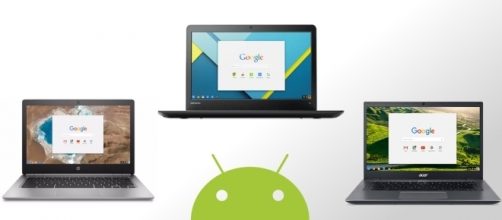For prospective new laptop users or those looking to change over, the two obvious choices have been one that runs on Windows, or a MacBook. Now there have been alternatives to the left-right fork between Microsoft and Apple; Google for instance has been pushing their Linux-developed Chrome OS which runs their line of Chrome-book laptops manufactured by major brands like Acer, Samsung, Lenovo and Hewlett-Packard. After a shaky start these Chrome-OS computers (Chrome browser, Gmail, Google Docs, etc.) have since hit their stride and are only getting better in 2017, when all Chrome-books will be able to support and run the latest version Android apps, complete with having Google Play Store access.
Android on your lap
Granted, as of now everything is still on the beta stage, but this new development is something Android smartphone users in the know have been waiting for so long. Where before the Android support has only been available to Chrome-books made by Asus, Acer and Google itself, not only will all 2017 Chrome-books and beyond can now run Android apps, the feature would be added on to past models by Dells, Toshiba and other brands, for a grand total of some 60 existing types.
How this works is simple: Chrome-book users must register with their Google account if they have one, on the Google Play Store. Remember however that the Chrome-books came from different manufacturers as said before, and the only ones who could reliably run some Android apps are those running Chrome OS 53.
Nevertheless, not every app in Google Play is optimized for running on a Chrome-book, at least until the newest ones come out this year, or the existing Chrome-books with the muscle for it will have their systems updated this month. And then there’s the matter of certain Android apps that work awkwardly on Chrome OS.
Not all problems solved
An example of the difficulties faced in optimizing apps that run on an Android phone, with the Chrome OS support, can be seen on the Netflix app. On the Android it’s possible to have Netflix download some films or shows to be viewed offline later on. That feature doesn’t work when running Netflix on a compatible Chrome-book. Then again, this is but merely a reminder that the promised support is in its initial stages for the moment.
But take heart. Google really seems dead set on bridging the Android-Chrome OS gap. Once it happens, Android users can now see their favorite app games on a laptop screen for instance (like "Super Mario Run"), and Android programmers and developers can now try their hand on bigger things with the up and coming laptops. Microsoft and Apple have every right to be wary of Google if their big push pays off.

